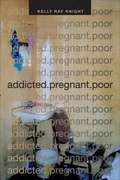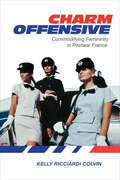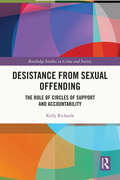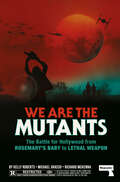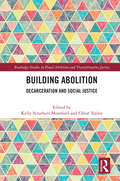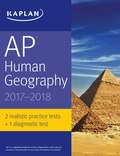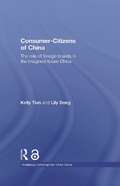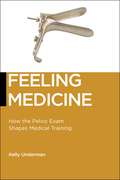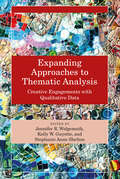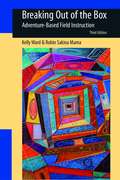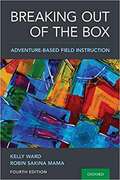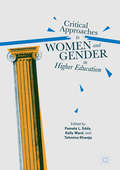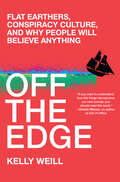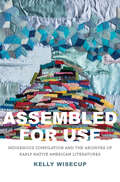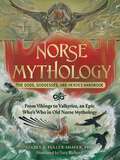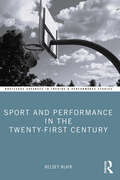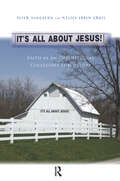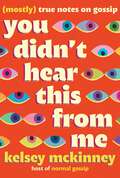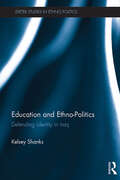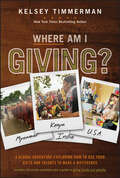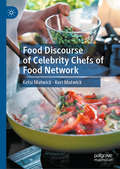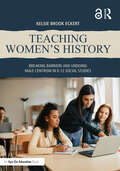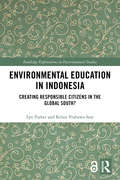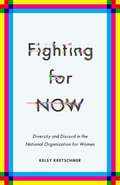- Table View
- List View
addicted.pregnant.poor
by Kelly Ray KnightFor the addicted, pregnant, and poor women living in daily-rent hotels in San Francisco's Mission district, life is marked by battles against drug cravings, housing debt, and potential violence. In this stunning ethnography Kelly Ray Knight presents these women in all their complex humanity and asks what kinds of futures are possible for them given their seemingly hopeless situation. During her four years of fieldwork Knight documented women's struggles as they traveled from the street to the clinic, jail, and family court, and back to the hotels. She approaches addicted pregnancy as an everyday phenomenon in these women's lives and describes how they must navigate the tension between pregnancy's demands to stay clean and the pull of addiction and poverty toward drug use and sex work. By creating the space for addicted women's own narratives and examining addicted pregnancy from medical, policy, and social science perspectives, Knight forces us to confront and reconsider the ways we think about addiction, trauma, health, criminality, and responsibility.
Charm Offensive: Commodifying Femininity in Postwar France
by Kelly Ricciardi ColvinIn the aftermath of the Second World War, the French government cultivated images of sensual and sophisticated white French women in an attempt to reestablish its global image as a great nation. They promoted the beauty, sexual appeal, and general allure of French women, all while shrinking the boundaries of what was considered beautiful. Charm Offensive explores how this elevation of French femininity created problems on both sides of the equation: the pressure on French women to conform to an exacting physical standard was immense, while the inability of anyone else to access that standard resulted in a sense of failure. Drawing on cultural figures like Air France hostesses, tourism workers, and celebrities such as Brigitte Bardot, Charm Offensive offers an innovative understanding of a tumultuous time of decolonization.
Desistance from Sexual Offending: The Role of Circles of Support and Accountability (Routledge Studies in Crime and Society)
by Kelly RichardsThis book explores how Circles of Support and Accountability can reduce sexual reoffending. The release of a notorious sex offender from prison strikes fear into members of the public. Media coverage often provokes further panic, casting such offenders as irredeemable monsters and ticking time bombs, destined to continue preying on innocent children and women. In the West, governments have responded by enacting heavily punitive and exclusionary policies, such as public sex offender registers, indefinite detention, and lifetime correctional supervision. A radically different approach – Circles of Support and Accountability (CoSA) – emerged alongside these measures. CoSA are groups of trained volunteers who collectively resist the exclusionary impulse, instead actively supporting those with sexual offence convictions to reintegrate into communities. Despite their seemingly counterintuitive nature, the research is clear that CoSA reduce sexual reoffending far better than more popular draconian sex offender management policies. However, little is understood about how CoSA work. This book begins to address this gap by proposing a new way of understanding how CoSA reduce sexual reoffending. Drawing on 65 in-depth interviews with CoSA participants, it offers a new theoretically-informed empirical explanation of CoSA’s capacity to promote desistance from sexual offending, and to turn those convicted of sexual offenders into law-abiding and productive members of the community. Ultimately it is a call to action, demonstrating that we, the community, must play a more central role in integrating people with sexual offence convictions if we desire safer communities for our children and our selves. This work illuminates new directions for research, policy, and practice, and is essential reading for academics and students engaged in the study of criminology and criminal justice, restorative justice, sexual violence, and reentry
Beyond Fitting In: Rethinking First-Generation Writing and Literacy Education
by Kelly RitterBeyond Fitting In interrogates how the cultural capital and lived experiences of first-generation college students inform literacy studies and the writing-centered classroom. Essays, written by scholar-teachers in the field of rhetoric and composition, discuss best practices for teaching first-generation students in writing classrooms, centers, programs, and other environments. The collection considers how first-gen students of different demographics interact with and affect literacy instruction in a variety of public and private, rural and urban schools offering two- or four-year programs, including Hispanic-serving institutions, historically Black colleges and universities, and public research universities. By exploring the experiences of students, teachers, writing program administrators, and writing center directors, the volume gives readers an inside view of the practices and structures that shape the literacy of first-generation students.
We Are the Mutants: The Battle for Hollywood from Rosemary's Baby to Lethal Weapon
by Kelly Roberts, Michael Grasso and Richard McKennaAn offbeat odyssey through the most daring and disruptive phase of American cinema since the advent of sound — during the most transformative and tumultuous period of American history since the Civil War.We Are the Mutants is a critical reassessment of what is arguably the most discussed and beloved stretch of movies in Hollywood history.Documenting the period between the arrival of US combat troops in Vietnam and the end of President Ronald Reagan&’s second term, it forgoes the usual and restrictive exemplars of &“auteur cinema,&” and instead focuses on an eclectic selection of films and genres — horror, documentary, disaster, vigilante action, neo-noir, post-apocalyptic sci-fi — to track this period's tumultuous transformation in American life, culture, and politics.Covering everything from Rosemary&’s Baby and Enter the Dragon to Escape from New York and Fatal Attraction, and from manufactured blockbusters and studio sleepers to forgotten Bs and cult classics, We Are the Mutants re-writes the history of modern American cinema, and in doing so, the history of America itself.
Building Abolition: Decarceration and Social Justice (Routledge Studies in Penal Abolition and Transformative Justice)
by Kelly Struthers MontfordBuilding Abolition: Decarceration and Social Justice explores the intersections of the carceral in projects of oppression, while at the same time providing intellectual, pragmatic, and undetermined paths toward abolition. Prison abolition is at once about the institution of the prison, and a broad, intersectional political project calling for the end of the social structured by settler colonialism, anti-black racism, and related oppressions. Beyond this, prison abolition is a constructive project that imagines and strives for a transformed world in which justice is not equated with punishment, and accountability is not equated with caging. Composed of sixteen chapters by an international team of scholars and activists, with a Foreword by Perry Zurn and an Afterword by Justin Piché, the book is divided into four themes: • Prisons and Racism • Prisons and Settler Colonialism • Anti-Carceral Feminisms • Multispecies Carceralities. This book will be of interest to undergraduate and postgraduate students, activists, and scholars working in the areas of Critical Prison Studies, Critical Criminology, Native Studies, Postcolonial Studies, Black Studies, Critical Race Studies, Gender and Sexuality Studies, and Critical Animal Studies, with particular chapters being of interest to scholars and students in other fields, such as, Feminist Legal Studies, Animal Law, Critical Disability Studies, Queer Theory, and Transnational Feminisms.
AP Human Geography 2017-2018
by Kelly SwansonThe only Advanced Placement test preparation guide that delivers 75 years of proven Kaplan experience and features exclusive strategies, practice, and review to help students ace the AP Human Geography exam! Students spend the school year preparing for the AP Human Geography test. Now it’s time to reap the rewards: money-saving college credit, advanced placement, or an admissions edge. However, achieving a top score on the AP Human Geography exam requires more than knowing the material—students need to get comfortable with the test format itself, prepare for pitfalls, and arm themselves with foolproof strategies. That’s where the Kaplan plan has the clear advantage. Kaplan's AP Human Geography 2017-2018 offers many essential and unique features to help improve test scores, including: * Two full-length practice tests and a diagnostic test to target areas for score improvement * Detailed answer explanations * Tips and strategies for scoring higher from expert AP Human Geography teachers and students who got a perfect 5 on the exam * Targeted review of the most up-to-date content, including key information that is specific to the AP Human Geography exam * Glossary of key terms and concepts Kaplan's AP Human Geography 2017-2018 author Kelly Swanson has over 15 years of experience consulting and developing Human Geography curriculum. His expertise has helped make this and other books the best that Kaplan has to offer in AP test prep. Kaplan has helped millions of students to prepare for standardized tests. We invest millions of dollars annually in research and support for our products. We know that our test-taking techniques and strategies work. AP Human Geography 2017-2018 is the must-have preparation tool for every student looking to do better on the AP Human Geography test!
Consumer-Citizens of China: The Role of Foreign Brands in the Imagined Future China (Routledge Contemporary China Series)
by Kelly Tian Lily DongA PDF version of this book is available for free in open access via www.tandfebooks.com as well as the OAPEN Library platform, www.oapen.org. It has been made available under a Creative Commons Attribution-Non Commercial-No Derivatives 3.0 license and is part of the OAPEN-UK research project. This book presents a comprehensive examination of Chinese consumer behaviour and challenges the previously dichotomous interpretation of the consumption of Western and non-Western brands in China. The dominant position is that Chinese consumers are driven by a desire to imitate the lifestyles of Westerners and thereby advance their social standing locally. The alternative is that consumers reject Western brands as a symbolic gesture of loyalty to their nation-state. Drawing from survey responses and in depth interviews with Chinese consumers in both rural and urban areas, Kelly Tian and Lily Dong find that consumers situate Western brands within select historical moments. This embellishment attaches historical meanings to Western brands in ways that render them useful in asserting preferred visions of the future China. By highlighting how Western brands are used in contests for national identity, Consumer-Citizens of China challenges the notion of the "patriot’s paradox" and answers scholars’ questions as to whether Chinese nationalists today allow for a Sino-Western space where the Chinese can love China without hating the West. Consumer-Citizens of China will be of interest to students and scholars of business studies, Chinese and Asian Studies and Political Science. Kelly Tian is Professor of Marketing and holds the Anderson Chair of Business at New Mexico State University. Lily Dong is Associate Professor of Marketing at the University of Alaska at Fairbanks.
Feeling Medicine: How the Pelvic Exam Shapes Medical Training (Biopolitics #21)
by Kelly UndermanHonorable Mention, Sociology of the Body and Embodiment Best Publication Award, given by the Body and Embodiment Section of the American Sociological AssociationThe emotional and social components of teaching medical students to be good doctorsThe pelvic exam is considered a fundamental procedure for medical students to learn; it is also often the one of the first times where medical students are required to touch a real human being in a professional manner. In Feeling Medicine, Kelly Underman gives us a look inside these gynecological teaching programs, showing how they embody the tension between scientific thought and human emotion in medical education. Drawing on interviews with medical students, faculty, and the people who use their own bodies to teach this exam, Underman offers the first in-depth examination of this essential, but seldom discussed, aspect of medical education. Through studying, teaching, and learning about the pelvic exam, she contrasts the technical and emotional dimensions of learning to be a physician. Ultimately, Feeling Medicine explores what it means to be a good doctor in the twenty-first century, particularly in an era of corporatized healthcare.
Expanding Approaches to Thematic Analysis: Creative Engagements with Qualitative Data
by Stephanie Anne Shelton Kelly W. GuyotteExpanding Approaches to Thematic Analysis: Creative Engagements with Qualitative Data springboards readers into a world where generating themes from qualitative data is a creative, experimental, and wondrous process!While no one ever said it had to be, thematic analysis is invariably described as a step-by-step process that involves coding. Yet qualitative data analysis is more than a technical procedure—it invokes imagination and inspiration—intuitional engagements that are as vital to the data analysis process as they are difficult to describe. This edited book begins with two premises: (1) there is more than one way to theme data, and (2) qualitative researchers do not have to code to get to themes. Each chapter introduces readers to a different approach to thematic analysis, explores that approach’s theoretical and disciplinary roots, and illustrates how that approach can be used to generate themes. Approaches include annotating, memoing, storying, writing, composing poems, artmaking, meditating, and more, expanding conceptualizations of what themes and thematic analysis can be. The book also includes ‘methodologies in action’: helpful examples of creative theming from doctoral students and early career scholars.This book is as much a provocation for engaging thematic analysis beyond/without/in addition to coding as it is a resource for anyone interested in the rationale, justification, and examples for doing so. As such, it is a source of inspiration for any qualitative student, researcher, and scholar who wishes to expand their repertoire of approaches to thematic analysis.
Breaking Out Of The Box: Adventure-based Field Instruction, Third Edition
by Kelly Ward Robin S. MamaMoving from the classroom to the field can be a daunting transition for many social work students, but Breaking Out of the Box offers experiential, adventure-based learning to help students acquire the skills essential for success. Ward and Mama stress individual decision making within a groupsetting, so readers develop individualized abilities as well as proficiency in group communication, group problem solving, leadership roles, and relationship building. The book uses interactive exercises to integrate cross-curriculum content, from theory to assessment to cultural competency,allowing students to obtain a new perspective as they navigate through field placement and into their professional careers.
Breaking Out of the Box: Adventure-based Field Instruction
by Kelly Ward Robin Sakina MamaMoving from the classroom to the field is often a daunting transition for social work students. In this new edition of their celebrated text, Kelly Ward and Robin Sakina Mama address student fears and concerns with a straightforward, adventure-based instruction method. Using interactive exercises to integrate cross-curricula content, Breaking Out of the Box, Fourth Edition, encourages students to gain perspective and insight as they navigate field placement and their growing careers. <p><p> Previous editions of Breaking Out of the Box have been commended for their direct and honest approach to a wide array of concerns shared by social workers and students. The fourth edition returns to this mission with a new chapter on emotional intelligence written with the authors' hands-on and direct approach. <p><p> The book's exercises allow students to become comfortable using vital social work tools and theories outside of the classroom. Emphasis on individual decision making within group settings fosters independent skills and confidence in addition to proficient group work and leadership skills. In Breaking Out of the Box, Ward and Mama prepare social work students for the full scope of their careers in the field in one crucial text.
Critical Approaches to Women and Gender in Higher Education
by Pamela L. Eddy Kelly Ward Tehmina KhwajaThis volume provides a critical examination of the status of women and gender in higher education today. Despite the increasing numbers of women in higher education, gendered structures continue to hinder women's advancement in academia. This book goes beyond the numbers to examine the issues facing those members of academia with non-dominant gender identities. The authors analyze higher education structures from a range of perspectives and offer recommendations at individual and institutional levels to encourage activism and advance equality in academia.
Off the Edge: Flat Earthers, Conspiracy Culture, and Why People Will Believe Anything
by Kelly Weill&“A deep dive into the world of Flat Earth conspiracy theorists . . . that brilliantly reveals how people fall into illogical beliefs, reject reason, destroy relationships, and connect with a broad range of conspiracy theories in the social media age. Beautiful, probing, and often empathetic . . . An insightful, human look at what fuels conspiracy theories.&” —Science Since 2015, there has been a spectacular boom in a centuries-old delusion: that the earth is flat. More and more people believe that we all live on a pancake-shaped planet, capped by a solid dome and ringed by an impossible wall of ice. How? Why? In Off the Edge, journalist Kelly Weill draws a direct line from today&’s conspiratorial moment, brimming not just with Flat Earthers but also anti-vaxxers and QAnon followers, back to the early days of Flat Earth theory in the 1830s. We learn the natural impulses behind these beliefs: when faced with a complicated world out of our control, humans have always sought patterns to explain the inexplicable. This psychology doesn&’t change. But with the dawn of the twenty-first century, something else has shifted. Powered by Facebook and YouTube algorithms, the Flat Earth movement is growing. At once a definitive history of the movement and an essential look at its unbelievable present, Off the Edge introduces us to a cast of larger-than-life characters. We meet historical figures like the nineteenth-century grifter who first popularized the theory, as well as the many modern-day Flat Earthers Weill herself gets to know, from moms on vacation to determined creationists to neo-Nazi rappers. We discover what, and who, converts people to Flat Earth belief, and what happens inside the rabbit hole. And we even meet a man determined to fly into space in a homemade rocket-powered balloon—whose tragic death is as senseless and absurd as the theory he sets out to prove. In this incisive and powerful story about belief, Kelly Weill explores how we arrived at this moment of polarized realities and explains what needs to happen so that we might all return to the same spinning globe.
Assembled for Use: Indigenous Compilation and the Archives of Early Native American Literatures (The Henry Roe Cloud Series on American Indians and Modernity)
by Kelly WisecupA wide-ranging, multidisciplinary look at Native American literature through non-narrative texts like lists, albums, recipes, and scrapbooks &“An intricate history of Native textual production, use, and circulation that reshapes how we think about relationships between Native materials and settler-colonial collections.&”—Rose Miron, D&’Arcy McNickle Center for American Indian and Indigenous Studies at the Newberry Library Kelly Wisecup offers a sweeping account of early Native American literatures by examining Indigenous compilations: intentionally assembled texts that Native people made by juxtaposing and recontextualizing textual excerpts into new relations and meanings. Experiments in reading and recirculation, Indigenous compilations include Mohegan minister Samson Occom&’s medicinal recipes, the Ojibwe woman Charlotte Johnston&’s poetry scrapbooks, and Abenaki leader Joseph Laurent&’s vocabulary lists. Indigenous compilations proliferated in a period of colonial archive making, and Native writers used compilations to remake the very forms that defined their bodies, belongings, and words as ethnographic evidence. This study enables new understandings of canonical Native writers like William Apess, prominent settler collectors like Thomas Jefferson and Henry Rowe Schoolcraft, and Native people who contributed to compilations but remain absent from literary histories. Long before current conversations about decolonizing archives and museums, Native writers made and circulated compilations to critique colonial archives and foster relations within Indigenous communities.
Norse Mythology: From Vikings to Valkyries, an Epic Who's Who in Old Norse Mythology
by Kelsey A. Fuller-ShaferDiscover the gods, goddesses, and heroes from Norse mythology with this beautiful handbook that captures the ancient stories that captivated the Vikings.Learn more about your favorite Norse gods, goddesses, and heroes with this collection of profiles that share the real stories behind the characters. With characters from Norse myths coming to life on the big and small screens, and in the pages of new and exciting fiction, this guide can give you all the details you need to understand your favorite heroes, villains, and powerful deities. With comprehensive entries that outline each character&’s names, roles, related symbols, and foundational myths, you can get to know the roots of these personas, and better understand the new stories we tell about them today.
Sport and Performance in the Twenty-First Century (Routledge Advances in Theatre & Performance Studies)
by Kelsey BlairAnalyzing sport through the lens of performance and theorizing performance through the lens of sport, Sport and Performance in the Twenty-First Century offers a field intervention, a series of in-depth performance analyses, and an investigation of the intersection between sport performances and public life in the historical present in the global north. The objectives of this book are three-fold. First, the book advocates for the study of sport in the fields of Theatre and Performance Studies and, through in-depth performance analyses, demonstrates how the critical language and methods of performance studies help illuminate the manifold impacts of the practices, activities, and events of sport. Second, the book introduces new critical language that was originally developed in conjunction with sport but is also designed for cross-genre performance analysis. In introducing novel terminology, the book aims to simultaneously facilitate analysis of sport performances and to demonstrate how the study of sport can contribute to the fields of Theatre and Performance Studies. Finally, the book investigates the epistemological, affective, and socio-political effects of sport performances in order to illuminate how sport performances influence, and are influenced by, their historical conditions. This study will be of great interest to students and scholars in Theatre and Performance Studies, Physical Culture Studies, and Socio-Cultural Sports Studies.
It’s All About Jesus!: Faith as an Oppositional Collegiate Subculture
by Peter M. Magolda Kelsey Ebben GrossWhat is it like to be a collegian involved in a Christian organization on a public college campus? What roles do Christian organizations play in the lives of college students enrolled in a public college? What are evangelical student organizations’ political agendas, and how do they mobilize members to advance these agendas? What is the optimal equilibrium between the secular and the sacred within public higher education? What constitutes safe space for evangelical students, and who should provide this space? This book presents a two-year ethnographic study of a collegiate evangelical student organization at a public university, authored by two “non-evangelicals.” The authors provide a glimpse into the lives of college students who join evangelical student organizations and who subscribe to an evangelical way of life during their college years. They offer empirically derived insights as to how students’ participation in a homogeneous evangelical student organization enhances their satisfaction of their collegiate experience and helps them develop important life lessons and skills. Ironically, while Christian students represent the religious majority on the campus under study, Christian organizations on this campus mobilize members by capitalizing on members’ shared sense of marginalization, and position themselves as cultural outsiders. This evangelical student organization serves as a safe space for students to express their faith within the larger secular university setting.The narratives and interpretations aim not only to enrich understanding of a particular student organization but more importantly to spark intellectual discourse about the value of faith-based organizations within public higher education. The role of religion in public higher education, student involvement in the co-curriculum, and peer education are three examples of critical issues in higher education for which this idiosyncratic case study offers broad understanding. It’s All About Jesus! targets multiple audiences – both sacred and secular. For readers unfamiliar with evangelical collegiate organizations and the students they serve, the authors hope the narratives make the unfamiliar familiar and the dubious obvious. For evangelicals, the authors hope that the thickly described narratives not only make the familiar, familiar and the obvious, obvious, but also uncover the tacit meaning embedded in these familiar, but seldom examined subculture rituals.The authors hope this book spurs discussion on topics such as campus power and politics, how organizations interact with the secular world around them, and how members can improve their organizations. Additionally, this text urges secular readers in student affairs to consider the many benefits, as well as liabilities, of “parachurches” as co-curricular learning sites on campus.Lastly, given that the authors lay bare their methodology, their use of theory, and the tensions between their perspectives and those of the participants, this book will serve as a compelling case study for courses on qualitative research within religion studies, anthropology, sociology, and cultural studies fields.
You Didn't Hear This From Me: (Mostly) True Notes on Gossip
by Kelsey McKinneyONE OF LITHUB'S MOST ANTICIPATED BOOKS OF 2025 <p> “Gossip is the only cultural tradition I care about, and Kelsey McKinney has written its Bible” – Samantha Irby, #1 NYT bestselling author. <p> From the host of the Normal Gossip podcast, a delightfully insightful exploration of our obsession with gossip that weaves together journalism, cultural criticism, and memoir. As the pandemic forced us to socialize at a distance, Kelsey McKinney was mourning the juicy updates and jaw-dropping stories she’d typically collect over drinks with friends—and from her hunger, the blockbuster Normal Gossip podcast was born. With listenership in the millions, Kelsey found herself thinking more critically about gossip as a form, and wanting to better understand the role it plays in our culture. <p> In You Didn't Hear This From Me, McKinney explores the murkiness of everyday storytelling. Why is gossip considered a sin, and how can we better recognize when it's being weaponized? Why do we think we’re entitled to every detail of a celebrity’s personal life? And how do we define “gossip,” anyway? As much as the book aims to treat gossip as a subject worthy of rigor, it also hopes to capture the heart of gossiping: how enchanting and fun it can be to lean over and whisper something a little salacious into your friend’s ear. With wit and honesty, McKinney unmasks what we're actually searching for when we demand to know the truth—and how much the truth really matters in the first place. <b>New York Times Bestseller</b>
Education and Ethno-Politics: Defending Identity in Iraq (Exeter Studies in Ethno Politics)
by Kelsey ShanksThe Iraqi Disputed Territories consist of 15 districts stretching across four northern governorates. While an administrative solution for the disputed territories remains evasive, minority groups across the region have been pulled into a clash over demographic composition as each disputed district faces ethnically defined claims. Meanwhile, inter-ethnic communal tensions are rising and questions of identity increasingly overshadow day-to-day life. There has been little research on the impact of heightened identity politics on the everyday lives of citizens. Regardless of the final administrative outcome, the multi-ethnic population of the region requires services and systems of co-existence, and in the fragile ethno-political environment of the disputed territories, the way in which the education system manages ethnic diversity is crucial. It is within this context that Education and Ethno-Politics examines the development of education systems across the region post 2003. Drawing on over 50 interviews with regional education officials and community representatives, the book presents the impact of amplified ethno-politics on the reconstruction of education in Iraq. It provides the first academic exploration into education in the region, exploring the significance of cultural reproduction and the link between demands for ethnically specific education, societal security and the wider political contestation over the territory. A comprehensive analysis of the powerful role of education in identity-based conflicts, this book offers a highly insightful examination of Iraq's past and present, as well as formulating policy recommendations for its future. It is an essential resource for students, scholars and policy makers with focus on the Middle East, specifically Iraqi and Kurdish studies, as well as those interested in Education policy and Conflict studies.
Where Am I Giving: A Global Adventure Exploring How To Use Your Gifts And Talents To Make A Difference (Where am I?)
by Kelsey TimmermanYour gifts connect you to a world of giving Americans are generous with their pocketbooks, but trying to make a difference and actually making a difference are two different things. Where Am I Giving? by New York Times bestselling author Kelsey Timmerman takes you on a journey to meet people who will inspire you to live a purpose-filled, generous life and make the greatest impact you can through your career, time, consumer dollars, and donations. Starting in his hometown of Muncie, Indiana, and then traveling all over the world (Myanmar, Kenya, India, Nepal, and more), Kelsey explores not only different ways of giving—as a worker, consumer, volunteer, giver, local and global citizen—but also the benefits and effectiveness of these methods. He spends time with monks, students, a refugee, a Marine, a former Hollywood executive, Peace Corps Volunteers, and seasoned aid workers to explore how they give, as well as with the people on the receiving end of their giving. Along the way he struggles to be a more informed giver as he becomes a "voluntourist,” starts his own local non-profit, and searches for a balance between rationality and passion in how he gives. This book will help you: Reveal the amazing opportunities you have to make an impact using your own gifts—and it doesn't have to be money Understand the sociology, philosophy, anthropology, and neuroscience of giving See how giving can make you more connected and happier Examine types of giving, including microlending, volunteering, donating, ethical consumption, mission trips, voluntourism, child sponsorship, etc. Dive into a nuanced view of effectiveness of international aid and its intersection with development, politics, and culture Where Am I Giving? is a fast-paced narrative combining compelling stories collected over 15 years of travel to 90+ countries, mixed with practical advice on how to make giving a part of our everyday lives.
Food Discourse of Celebrity Chefs of Food Network
by Kelsi Matwick Keri MatwickFood Discourse explores a fascinating, yet virtually unexplored research area: the language of food used on television cooking shows. It shows how the discourse of television cooking shows on the American television channel Food Network conveys a pseudo-relationship between the celebrity chef host and viewers. Excerpts are drawn from a variety of cooking show genres (how-to, travel, reality, talk, competition), providing the data for this qualitative investigation. Richly interdisciplinary, the study draws upon discourse analysis, narrative, social semiotics, and media communication in order to analyze four key linguistic features – recipe telling, storytelling, evaluations, and humor – in connection with the themes of performance, authenticity, and expertise, essential components in the making of celebrity chefs. Given its scope, the book will be of interest to scholars of linguistics, media communication, and American popular culture. Further, in light of the international reach and influence of American television and celebrity chefs, it has a global appeal.
Teaching Women's History: Breaking Barriers and Undoing Male Centrism in K-12 Social Studies
by Kelsie Brook EckertTeaching Women’s History: Breaking Barriers and Undoing Male Centrism in K-12 Social Studies challenges and guides K-12 history teachers to incorporate comprehensive and diverse women’s history into every region and era of their history curriculum.Providing a wealth of practical examples, ideas, and lesson plans – all backed by scholarly research – for secondary and middle school classes, this book demonstrates how teachers can weave women’s history into their curriculum today. It breaks down how history is taught currently, how teachers are prepared, and what expectations are set in state standards and textbooks and then shows how teachers can use pedagogical approaches to better incorporate women’s voices into each of these realms. Each chapter explores a major barrier to teaching an inclusive history and how to overcome it, and every chapter ends with an inquiry-based lesson plan on women or using women's sources which stands counter to the way curriculum is traditionally taught, a case in point that tasks readers to realize how women have been integral to every period of history.With expert guidance from an award-winning social studies teacher, this guidebook will be important reading for middle and high school history educators. It will also be beneficial to preservice teachers, particularly within Social Studies Education and Gender Studies.Additional resources for educators are available to view at www.remedialherstory.com.
Environmental Education in Indonesia: Creating Responsible Citizens in the Global South? (Routledge Explorations in Environmental Studies)
by Lyn Parker Kelsie Prabawa-SearIndonesia’s wealth of natural resources is being exploited at breakneck speed, and environmental awareness and knowledge among the populace is limited. This book examines how young people learn about the environment to see how education can help to develop environmental awareness and avert vast environmental destruction, not only in Indonesia, but also in the Global South more generally. Based on in-depth studies conducted in the cities of Yogyakarta and Surabaya, complemented with surveys of students in secondary schools, Environmental Education in Indonesia examines educational curricula, pedagogy and "green" activities to reveal what is currently being done in schools to educate children about the environment. The book investigates the shortcomings in environment education, including underqualified teachers, the civil service mentality, the still-pervasive chalk-and-talk pedagogy and the effect of the examination system. It also analyses the role of local government in supporting (or not) environmental education, and the contribution of environmental NGOs. The book establishes that young people are not currently being exposed to effective environmental education, and the authors propose that the best and most culturally appropriate way forward in Indonesia is to frame pro-environment behaviour and responsibility as a form of citizenship, and specifically that environmental education should be taught as a separate subject. This book will be of great interest to students and scholars of contemporary Indonesia and Southeast Asia, education for sustainability and environmental education, as well as sustainability and sustainable development more generally.
Fighting for NOW: Diversity and Discord in the National Organization for Women
by Kelsy KretschmerAn unparalleled exploration of NOW’s trajectory, from its founding to the present—and its future A new wave of feminist energy has swept the globe since 2016—from women’s marches and the #MeToo movement to transwomen’s inclusion and exclusion in feminism and participation in institutional politics. Amid all this, an organization declared dead or dying for thirty years—the National Organization for Women—has seen a membership boom. NOW presents an intriguing puzzle for scholars and activists alike. Considered one of the most stable organizations in the feminist movement, it has experienced much conflict and schism. Scholars have long argued that factionalism is the death knell of organizations, yet NOW continues to thrive despite internal conflicts. Fighting for NOW seeks to better understand how bureaucratic structures like NOW’s simultaneously provide stability and longevity, while creating space for productive and healthy conflict among members. Kelsy Kretschmer explores these ideas through an examination of conflict in NOW’s local chapters, its task forces and committees, and its satellite groups. NOW’s history provides evidence for three basic arguments: bureaucratic groups are not insulated from factionalism; they are important sites of creativity and innovation for their movements; and schisms are not inherently bad for movement organizations. Hence, Fighting for NOW is in stark contrast to conventional scholarship, which has conceptualized factionalism as organizational failure. It also provides one of the few book-length explorations of NOW’s trajectory, from its founding to the modern context. Scholars will welcome the book’s insights that draw on open systems and resource dependency theories, as well as its rethinking of how conflict shapes activist communities. Students will welcome its clear and compelling history of the feminist movement and of how feminist ideas have changed over the past five decades.
